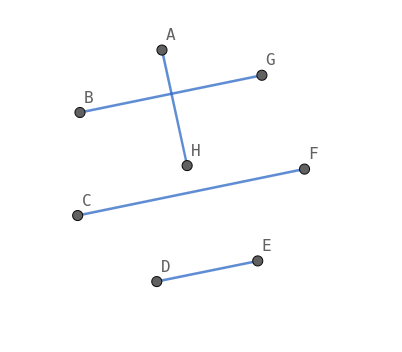有一张n(n为偶数)个点的完全图G,你需要为每条边确定一个不同的边权,使得这张图的最长单调上升路径边数最少
n≤500
原题中还给出了一个提示:
结论:假设带权无向图 G 有 100 个节点 1000 条边,且所有权值各不相同。那么,G 中一定存在一个单调上升路径,它的长度大于等于 20。
证明:假设每个节点上有一个探险家。我们按权值从小到大枚举所有的边,每次将该边连接的节点中的探险家的位置进行对调。可以知道,每个探险家都走的是一条单调上升路径。另外,由于共有 100 个探险家,而探险家一共走了 2000 步,所以有人走了 20 步。证毕。
Links
UOJ 201
Solution
由提示可以知道,一张n个点m条边的图,单调上升路径至少为n2m
因此完全图的单调上升路径至少为n−1,且所有极长单调上升路径长度都为
接下来,考虑把完全图的边分解成n−1个大小为2n的集合,每个集合的边都不在端点处相交
对于第i个集合,我们对其赋予从2n×(i−1)+1到2n×i大小的边权
这样最长上升路径显然不超过n−1,因为每组边集里的边都最多只经过一次
具体构造这个东西的话,可以把n−1个点围成一个圈,中间放一个点

每次构造这样的2n条边,然后把这个多边形旋转一下
特别神仙的一个构造。。。
Code
1
2
3
4
5
6
7
8
9
10
11
12
13
14
15
16
17
18
19
20
21
22
23
24
25
26
27
28
29
30
31
32
33
34
35
36
37
38
39
40
41
42
43
44
45
46
47
48
49
50
51
52
53
54
55
56
57
58
59
60
61
62
63
64
65
66
67
68
69
70
71
72
73
74
75
76
| #include <bits/stdc++.h>
#define x first
#define y second
#define y1 Y1
#define y2 Y2
#define mp make_pair
#define pb push_back
using namespace std;
typedef long long LL;
typedef pair <int, int> pii;
template <typename T> inline int Chkmax (T &a, T b) { return a < b ? a = b, 1 : 0; }
template <typename T> inline int Chkmin (T &a, T b) { return a > b ? a = b, 1 : 0; }
template <typename T> inline T read ()
{
T sum = 0, fl = 1; char ch = getchar();
for (; !isdigit(ch); ch = getchar()) if (ch == '-') fl = -1;
for (; isdigit(ch); ch = getchar()) sum = (sum << 3) + (sum << 1) + ch - '0';
return sum * fl;
}
inline void proc_status ()
{
ifstream t ("/proc/self/status");
cerr << string (istreambuf_iterator <char> (t), istreambuf_iterator <char> ()) << endl;
}
const int Maxn = 500 + 10;
int N;
int A[Maxn][Maxn];
inline int Pos (int x) { return (x + N - 2) % (N - 1) + 1; }
inline void add_edge (int x, int y, int z)
{
if (x > y) swap(x, y);
A[x][y] = z;
}
inline void Solve ()
{
int cnt = 0, K = N / 2 - 1;
for (int i = 1; i < N; ++i)
{
add_edge (i, N, ++cnt);
for (int j = 1; j <= K; ++j)
add_edge (Pos(i + j), Pos(i - j), ++cnt);
}
for (int i = 1; i < N; ++i)
for (int j = i + 1; j <= N; ++j)
printf("%d%c", A[i][j], j == N ? '\n' : ' ');
}
inline void Input ()
{
N = read<int>();
}
int main()
{
#ifndef ONLINE_JUDGE
freopen("A.in", "r", stdin);
freopen("A.out", "w", stdout);
#endif
Input ();
Solve ();
return 0;
}
|
